Lawmakers Aim to Make the Met Council Accountable
 The Metropolitan Council still holds the title of the biggest, most powerful unelected regional government in the country bar none. But that would change under proposed legislation calling for local elected officials to replace political appointees of the governor as Met Council representatives.
The Metropolitan Council still holds the title of the biggest, most powerful unelected regional government in the country bar none. But that would change under proposed legislation calling for local elected officials to replace political appointees of the governor as Met Council representatives.
“This legislation brings more openness to the Metropolitan Council by aligning its membership with local elected officials, giving regular citizens more voice in the make-up of the council and the important policies it implements,” said Rep. Tony Albright (R-Prior Lake), author of HF 828.
While the proposed legislative reforms were embraced by the agency’s critics as a step in the right direction, Center of the American Experiment urged legislators to take further measures to reduce the Met Council’s unprecedented scope of authority.
“The metro area needs good regional planning but it does not need a powerful regional “government” that dictates decisions that are best made by local officials,” said Kim Crockett, Center of the American Experiment Vice President and Senior Policy Fellow. “It does not need a regional body dictating transit, transportation policy as it affects roads, housing, water and sewer, and park policies.”
The Met Council is the sole metropolitan planning organization in the nation that’s not comprised of local elected officials who can be held accountable on regional issues decided by the agency. Federal law requires all metropolitan planning organizations to have a majority of elected officials but the Met Council’s unique governance structure was “grandfathered.”
At the same time, the Met Council wields a scope of authority far beyond the transportation planning that defines other regional governments, including the power to levy taxes.
As a result, the Met Council has evolved for all practical purposes into a state agency under control of the governor rather than an independent planning board in the eyes of a bipartisan coalition of cities and counties supporting the restructuring proposal.
“There is a very strong disconnect between very many local governments and the Metropolitan Council that’s evolved over many decades. Many local governments feel disenfranchised, cut out, on the outside looking in,” Dakota County Commissioner Chris Gerlach told the House Transportation and Regional Governance Policy Committee on Monday.
Momentum to reform the billion dollar agency has been mounting since metro cities and counties began seriously discussing the issue in 2014. Center of the American Experiment has also hosted numerous community forums to focus attention on Met Council lack of transparency and overreach.
For example, when state lawmakers declined to fund the Southwest Light Rail Transit line, Met Council announced it would go forward with funding the controversial $2 billion project anyway, despite previous assurances it would not. The regional authority has made millions of dollars in taxpayer funded park grants for local governments contingent on monitoring the race of visitors with “equity toolkits”. In addition, the agency’s unpopular 30-year comprehensive plan for the seven county metro region, Thrive MSP 2040, has been rejected by the four suburban counties and opposed by many cities.
“We are told how many types of certain housing units we must have, and how our own comprehensive plan needs to look. If we don’t conform, we have financing withheld. This financing comes in the form of taxation and sewer fees on our own residents, said Jason King, a Blaine City Councilor at a news conference to highlight the legislation. “…This overreach into municipal planning does not respect that local elected officials know what is best for their own city and how it should be allowed to grow and prosper.”
The proposed restructuring would increase the number of Met Council board members from 17 to 27. Most representatives would be selected by local elected officials from the sixteen Met Council Districts and must have an election certificate themselves.
An advocacy group called Metro Cities opposes the proposal, partly on the grounds that local elected officials could face a conflict of interest when voting on issues that affect their constituents in their roles on the Met Council. Others raised concerns about further politicizing the process.
“We rely on efficient high quality regional infrastructure and services,” Cottage Grove Mayor Myron Bailey testified in opposition. “The potential to undermine the provision of these services should not be underestimated as you consider this type of governance change.”
“The problem with that argument is that Minnesota has 10 non-urban and 7 urban regional authorities comprised of elected officials and other stakeholders that make regional decisions with much less drama than the Met Council,” Crockett said. “The best way to eliminate the concern about conflict of interest is to reduce the scope of the Met Council’s authority, starting with transit. The Met Council is currently empowered to plan, own and operate transit for the metro area, a clear conflict of interest that would not be eliminated by adding elected officials.”